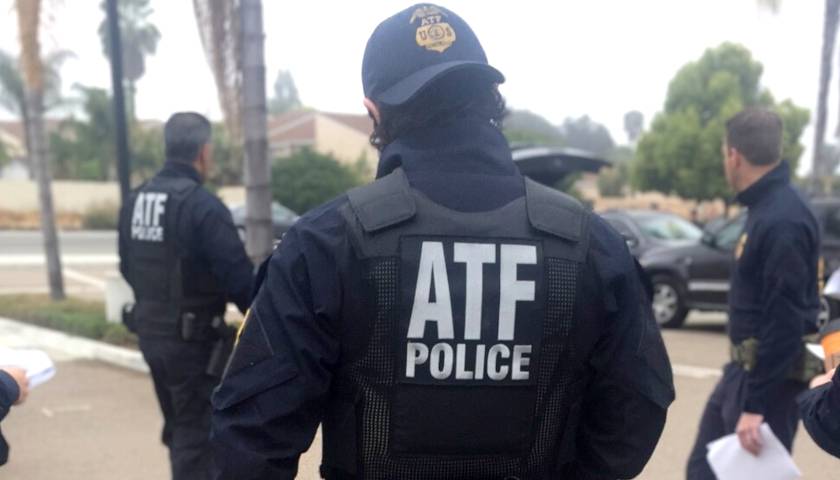by Steven Richards
Newly released videos show federal agents arriving to execute a search warrant on the home of the administrator of a local airport in Little Rock, Arkansas. The raid-gone-wrong in the predawn hours of March 19 ultimately led to the death of the administrator, Bryan Malinowski, after a brief standoff with the agents.
These videos, as well as a search warrant and affidavit previously published, shed light on why an administrator at the Bill and Hillary Clinton National Airport was under investigation by the Bureau of Alcohol, Tobacco, Firearms, and Explosives (ATF). According to the ATF he was allegedly selling firearms without the proper licenses—some of which were reportedly used in crimes—and for misrepresenting his purpose on purchase forms.
Regardless of the allegations, Bud Cummins, the lawyer representing Malinowski’s estate, has concerns about whether the ATF followed proper procedures executing the search and noted that the ATF has not released footage from Body Worn Cameras (BWC) the agents are required to use, possibly violating administration policy established in the wake of major police-involved shootings. Cummings is a former U.S. attorney and onetime chief legal counsel to former Gov. Mike Huckabee.
The newly released videos show several ATF agents arriving in the early morning of March 19 in ten separate vehicles. The second video shows agents approaching the front door of the home where one officer applies what appears to be tape to obscure the doorbell camera on Malinowski’s home.
The security camera footage, released to the media by Cummins on Sunday, are the first pieces of footage to emerge from the incident and highlight the fact that no BWC footage has been released by authorities, despite regulations promulgated by the Biden Justice Department in the wake of the high-profile Breonna Taylor case.
“At this stage there is no publicly available evidence showing whether agents knocked on the door or announced their presence, adequately identifying themselves. Bryan’s wife Maer only heard loud banging immediately followed by the crash of the front door being forced open,” Cummins said in a statement to news media.
“Absent exigent circumstances (danger of losing evidence-drugs down the toilet; propensity for violence or escape) case law requires law enforcement officers to give dwelling occupants a reasonable time to come to the door and let them in,” he added, highlighting his concerns.
According to the press release, the loud noise of the agents forcing entry into the home awoke the Malinowskis. Bryan Malinowski then reportedly loaded a handgun and confronted the intruders in the dark. It is not currently known who fired first, but after a brief exchange of fire, Malinowski was shot in the head and killed.
“The Malinowski family believes the already known facts amply demonstrate ATF’s tactics on March 19 were reckless and incompetent, and completely unnecessary,” Cummins said of the incident.
In the wake of the shooting of Breonna Taylor in March 2020, the Biden administration promised reforms to no-knock warrant and body-worn camera policies to avoid any tragic incidents and promote accountability.
Reforms to no-knock warrants were distributed to by the Justice Department in a memo to federal law enforcement agencies, including the ATF. Building upon a general requirement for agents to “knock and announce their identity, authority and purpose, and demand to enter” before any entry is made, the Justice Department ordered its subordinate agencies to limit the use of no-knock entries.
One of the changes includes a direction to restrict their use to instances where an “agent has reasonable grounds to believe at the time the warrant is sought that knocking and announcing the agent’s presence would create an imminent threat of physical violence to the agent and/or another person,” according to the memo. The Justice Department noted this significantly narrowed scope would need to be followed, even in instances were evidence could be destroyed.
“Criminal investigators should determine with precision whether the agents knocked, whether they announced their presence, identity, and purpose, and whether they waited a reasonable amount of time before they breached,” Cummins said.
“The Malinowski home is almost 3000 square feet. It was 6am. Mr. Malinowski apparently had no idea he was under law enforcement scrutiny. The justification for the search involved suspicion of a crime carrying a puny 0–6-month U.S. Sentencing guideline range which typically results in a sentence of probation or more often probation ending with complete dismissal (pre-trial diversion),” he added.
The ATF declined to comment and noted the investigation is still active and ongoing.
The Arkansas State Police confirmed that it is conducting an investigation into whether or not the use of force was proper under state codes, a spokesperson told Just the News on Tuesday.
Cummins also noted the ATF has not released any BWC footage of the incident, despite requests from the Malinowski family.
Under ATF regulations for both special agents and local partners (known as Special Deputies) the agency is expected to “conduct an expedited review of the BWC recording(s)” to decide if a public release is appropriate, according to the policy regulating ATF agents.
“There is a presumption ATF will publicly release all TFO BWC recording(s) that depict an incident resulting in the serious bodily injury or death of another, as soon as practical unless there exist specific and compelling grounds to justify withholding, which cannot be resolved by redaction, partial withholding, or other means,” the second policy, regulating Task Force Officers and Special Deputies, reads.
The only other public information about the investigation into Malinowski that led to the search of his home and the shooting comes from a federal affidavit and search warrant. The affidavit contains significant redactions but indicates Malinowski was under surveillance by federal officials for what they believed was a scheme to sell firearms and skirt regulations.
According to the affidavit, Malinowski allegedly purchased firearms legally and when he filled out the purchase forms, indicated they were for private use. He would then resell the firearms at gun shows, using the “gun show loophole” in federal law that permits a sale without background checks. Twenty-one states and Washington, D.C., have extended the background check requirement beyond federal law to at least some gun sales from unlicensed sellers.
You can read the affidavit below:
In one instance described in the affidavit, Malinowski sold guns to undercover agents on January 27 at a gun show. The undercover agents reported Malinowski was operating as a vendor at the gun show, with “approximately 2-3 tables by himself.”
The “tables MALINOWSKI was operating had a rack with AR style pistols, two containers with various pistols, and several boxes of various types of ammunition,” the affidavit reads.
The federal investigators Malinowski violated federal gun laws by operating as a firearm seller without the proper licensing, a Federal Firearms License, or FFL. According to the U.S. code, it is unlawful for any person to “except a licensed importer, licensed manufacturer, or licensed dealer, to engage in the business of importing, manufacturing, or dealing in firearms, or in the course of such business to ship, transport, or receive any firearm in interstate or foreign commerce.”
Regardless of the allegations contained in the affidavit, Malinowski and Cummins believe the deadly use of force was probably unjustified given the circumstances.
“As part of his hobby of collecting, buying, and selling various items Bryan occasionally set up a table at local gun shows where he mainly displayed guns and coins. In Arkansas a private seller may legally sell a firearm without holding a federal firearm license (FFL) and without filling out forms or conducting background checks,” his lawyer said in a latter statement, released alongside the videos.
“Mr. Malinowski’s family and close friends don’t think he had any inkling ATF was concerned about his gun show sales. They are all confident that he would have never jeopardized his career in airport management by knowingly flaunting a regulation pertaining to his weekend hobby,” he added.
Cummins said, even if the government’s allegations are true, the evidence contained in the affidavit “only suggests he (perhaps unknowingly) crossed a subjective line which put him in a different class of weekend gun seller and obligated him to buy a $200 FFL license.”
In a statement released by Cummins, the family said they did “not understand the government’s decision which led to a dawn raid on the private home and triggered the use of deadly force.”
“Even if the allegations in the affidavit are true, they don’t begin to justify what happened,” the statement read, according to Arkansas Democrat Gazette. “At worst, Bryan Malinowski, a gun owner and gun enthusiast, stood accused of making private firearm sales to a person who may not have been legally entitled to purchase the guns.”
– – –
Steven Richards is a reporter at Just the News.
Photo “ATF Agents” by ATF.




